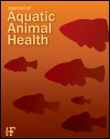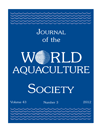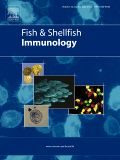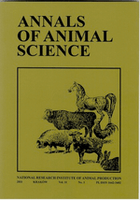
JOURNAL OF AQUATIC ANIMAL HEALTH
Scope & Guideline
Enhancing understanding of aquatic animal well-being.
Introduction
Aims and Scopes
- Aquatic Animal Health Management:
Research dedicated to understanding health management practices in aquatic species, including disease prevention and treatment methodologies. - Pathogen Detection and Characterization:
Studies focusing on the identification and characterization of pathogens affecting aquatic species, including bacteria, viruses, and parasites. - Physiological Responses to Environmental Stressors:
Research examining how aquatic animals respond physiologically to various environmental stressors, such as temperature fluctuations, pollution, and chemical exposure. - Nutritional and Dietary Impacts on Health:
Investigations into how dietary components and nutrition affect the health, growth, and immune responses of aquatic species. - Innovative Diagnostic Techniques:
Development and application of novel diagnostic tools and techniques for the early detection of diseases in aquatic animals. - Epidemiology and Disease Dynamics:
Studies that explore the epidemiology of diseases in aquatic populations, including transmission dynamics and outbreak investigations.
Trending and Emerging
- Molecular and Genetic Approaches to Disease Management:
An increasing number of studies are employing molecular techniques, such as real-time PCR and LAMP, to detect pathogens and understand genetic factors influencing disease resistance. - Impact of Environmental Pollutants on Aquatic Health:
Research focusing on the effects of pollutants, such as heavy metals and pharmaceuticals, on the health and physiology of aquatic animals is gaining traction. - Probiotics and Synbiotics in Aquaculture:
There is a rising interest in the use of probiotics and synbiotics to enhance fish health, growth performance, and immune responses, reflecting a shift towards more holistic aquaculture practices. - Advanced Imaging and Diagnostic Techniques:
Emerging techniques, such as computed tomography and magnetic resonance imaging, are being increasingly utilized to assess health issues in aquatic species, showcasing advancements in diagnostic capabilities. - Microbiome Research in Aquatic Species:
The exploration of gut microbiomes and their influence on health and disease in aquatic animals is becoming a prominent area of research, with implications for nutrition and disease management.
Declining or Waning
- Traditional Aquaculture Practices:
Research related to conventional aquaculture practices is becoming less frequent as the focus shifts towards more sustainable and innovative approaches to fish farming. - Generalized Pathogen Treatments:
Studies that provide broad-spectrum treatments for aquatic pathogens are waning, with a growing preference for targeted and species-specific therapeutic strategies. - Static Water Quality Assessments:
Research focusing solely on static water quality assessments is declining, as more studies emphasize dynamic and integrated approaches to water quality management. - Historical Data Analysis:
There is a noticeable reduction in studies that rely on historical data to assess trends in aquatic health, as contemporary research increasingly utilizes real-time monitoring and data analytics. - Non-specific Immune Responses:
Research concentrating on non-specific immune responses is decreasing in favor of studies that explore specific immune mechanisms and genetic factors influencing disease resistance.
Similar Journals

Large Animal Review
Connecting researchers and practitioners for better outcomes.Large Animal Review is a prestigious academic journal dedicated to advancing the field of veterinary science, particularly focusing on the health and management of large animals. Published by the SIVAR-SOC ITALIANA VETERINARI ANIMALI REDDITO, this journal is an invaluable resource for researchers, practitioners, and students eager to explore innovative methodologies, research findings, and case studies related to veterinary medicine for larger species. With a commitment to quality, Large Animal Review holds a Q3 categorization in the Veterinary (miscellaneous) sector according to the 2023 metrics, indicative of its growing influence within the academic community. The journal benefits from an international readership and is dedicated to fostering interdisciplinary collaborations, making it an essential addition to any professional's library. The journal is accessible through various platforms, ensuring wide distribution of its valuable content, as it strives to enhance the understanding and welfare of large animals across diverse settings.

BOLETIM DO INSTITUTO DE PESCA
Catalyzing dialogue on aquatic resource sustainability.BOLETIM DO INSTITUTO DE PESCA, published by the Instituto Pesca, is a Brazilian journal dedicated to advancing the fields of Animal Science and Aquatic Science. With its Open Access policy adopted in 2008, the journal ensures that research is widely disseminated, fostering collaboration and innovation among researchers, professionals, and students alike. Despite its recent Q4 category rankings in the 2023 metrics for both disciplines, the journal plays a vital role in providing a platform for emerging studies and critical discussions related to aquatic ecosystems and fisheries management. Covering a wide range of topics within its scope, BOLETIM DO INSTITUTO DE PESCA publishes original research, reviews, and case studies, stimulating academic dialogue and contributing to the sustainable management of aquatic resources in Brazil and beyond. This journal is an essential resource for anyone invested in marine and freshwater biology, ecology, and conservation.

CZECH JOURNAL OF ANIMAL SCIENCE
Bridging Theory and Practice in ZoologyThe Czech Journal of Animal Science, published by the Czech Academy Agricultural Sciences, is a premier open-access journal dedicated to advancing research in the fields of animal science and zoology. With an impressive ranking of Q2 in its category for 2023, it underscores its significance within the academic community, evidenced by its Scopus rank of #197 out of 490 in Animal Science and Zoology, placing it in the 59th percentile among peers. The journal has been a crucial platform for scholarly communication since its inception and has embraced open access since 2004, ensuring that research is widely available to a global audience. Targeted toward researchers, professionals, and students, the journal publishes high-quality original research, review articles, and case studies that contribute to the understanding and enhancement of animal science practices. Its commitment to rigorous peer review and its broad scope undoubtedly solidify its role as an essential resource for those engaged in animal research and agriculture, fostering continued innovation and knowledge transfer in this vital sector.

Frontiers in Animal Science
Empowering interdisciplinary collaboration for impactful studies.Frontiers in Animal Science is a pioneering academic journal dedicated to advancing knowledge and innovation in the fields of animal science and zoology. Published by FRONTIERS MEDIA SA in Switzerland, this open-access journal aims to bridge the gap between research and practice by providing a platform for impactful studies and discoveries. With an impressive Q2 classification in animal science and zoology for 2023, it ranks #222 out of 490 journals within the Scopus database, placing it within the 54th percentile of academic journals in its category. Since its inception in 2020, Frontiers in Animal Science has fostered interdisciplinary collaboration and innovation, encouraging researchers, professionals, and students alike to share their work and insights. By facilitating unrestricted access to quality research, this journal plays a crucial role in shaping the future of animal science and enhancing our understanding of animal biology and welfare.

Tropical Animal Science Journal
Connecting Science and Practice in Animal WelfareTropical Animal Science Journal, ISSN 2615-787X, E-ISSN 2615-790X, is an esteemed open-access journal published by the Bogor Agricultural University, Faculty of Animal Science. Launched in 2018, this journal serves as a pivotal platform for disseminating high-quality research in the fields of Animal Science, Food Animals, and Veterinary Medicine. With its significant presence in Indonesia and a commitment to scientific innovation, it has achieved a Q3 ranking in Animal Science and Zoology and Food Animals, as well as a Q2 ranking in Veterinary (miscellaneous) as of 2023. The journal also enjoys favorable Scopus rankings, placing it in the 61st percentile for General Veterinary and demonstrating its relevance and impact in the academic community. As an advocate for open-access publishing since its inception, the journal enhances accessibility to critical research findings, making it an invaluable resource for researchers, professionals, and students alike who aim to advance their knowledge and contribute to the fields of tropical animal science.

FISH PATHOLOGY
Connecting researchers to combat fish diseases effectively.FISH PATHOLOGY is a vital journal dedicated to the field of aquatic animal health, published by the Japan Society of Fish Pathology. With a strong publication history dating back to 1967, this interdisciplinary journal aims to promote high-quality research focusing on the pathologies affecting fish and other aquatic organisms. Despite its category quartiles ranking of Q3 in both Animal Science and Zoology and Aquatic Science, the journal maintains a growing presence within the scientific community, holding a respectable position in Scopus rankings. Researchers and professionals looking for deep insights into fish health management and disease pathology will find FISH PATHOLOGY to be an invaluable resource for advancing knowledge and fostering collaboration in this essential area of study. Although the journal does not currently offer open access, its comprehensive analyses and findings are crucial for both academic and practical applications in fisheries and aquaculture worldwide.

JOURNAL OF THE WORLD AQUACULTURE SOCIETY
Exploring the Depths of Aquaculture ScienceThe JOURNAL OF THE WORLD AQUACULTURE SOCIETY, published by WILEY, serves as a premier platform for researchers, practitioners, and academics in the thriving fields of aquaculture and aquatic sciences. With an ISSN of 0893-8849 and an E-ISSN of 1749-7345, this esteemed journal boasts an impressive ranking in Scopus, placing it in the Q1 quartile for both Agronomy and Crop Science and Aquatic Science. Recognized for its rigorous peer-review process and high-quality publications since its inception in 1986, the journal continues to play a vital role in disseminating cutting-edge research that addresses the complex challenges and opportunities within aquaculture practices globally. The journal's impact is underscored by its rank of #37 out of 247 within the category of Aquatic Science and #70 out of 406 in Agronomy in 2023, positioning it firmly in the top tier of scholarly journals. Researchers and professionals will find an invaluable resource in this journal, which not only aims to advance scientific knowledge but also fosters a community committed to sustainable aquatic development.

FISH & SHELLFISH IMMUNOLOGY
Bridging Aquatic Science and Immunological ResearchFISH & SHELLFISH IMMUNOLOGY is a premier journal dedicated to advancing the understanding of immune responses in fish and shellfish, published by Academic Press Ltd - Elsevier Science Ltd. Since its inception in 1991, this journal has played a crucial role in disseminating cutting-edge research that intersects aquatic science, immunology, and environmental chemistry. With an impressive impact factor reflected by its 2023 rankings, it holds a Q1 quartile in Aquatic Science and Immunology, indicating its significant prestige and influence within the scientific community. The journal not only serves as a vital resource for researchers and professionals in the field but also reaches a broader audience interested in the ecological and health implications of aquatic immunology. Although it follows a subscription model, its extensive reach and high visibility within databases ensure that groundbreaking research and reviews are accessible to those interested in advancing knowledge in these interdisciplinary areas. With ongoing convergence towards 2024 and beyond, FISH & SHELLFISH IMMUNOLOGY remains a central platform for innovative studies that continue to shape the future of aquaculture and environmental sustainability.

Annals of Animal Science
Elevating Animal Science to New HeightsAnnals of Animal Science is a prestigious academic journal, published by Walter de Gruyter GmbH in Germany, specializing in the multifaceted field of Animal Science. With an ISSN of 1642-3402 and an E-ISSN of 2300-8733, this journal is recognized for its high-impact contributions, holding a commendable impact factor that demonstrates its relevance in nurturing quality research. The journal has garnered Q2 rankings in 2023 across various categories including Animal Science and Zoology, Food Animals, and Small Animals. Notably, its Scopus Rankings indicate an elite standing, with the journal placing in the top 10% within its specific fields. Covering converged years from 2008 to 2024, the Annals of Animal Science serves as an essential platform for researchers, professionals, and students to disseminate knowledge and advance studies related to animal health, welfare, and production. The journal also emphasizes open access, promoting broader accessibility to foster collaboration and innovation in Animal Science globally. For those committed to advancing their understanding of veterinary and agricultural sciences, this journal is a vital resource.

Turkish Journal of Fisheries and Aquatic Sciences
Fostering collaboration in the world of aquatic sciences.Turkish Journal of Fisheries and Aquatic Sciences, published by the CENTRAL FISHERIES RESEARCH INST, is a key resource in the fields of Fisheries and Aquatic Sciences, catering to a global community of researchers and professionals. With its ISSN 1303-2712 and E-ISSN 2149-181X, this journal offers an engaging platform for the dissemination of high-quality research from Turkey, covering critical topics within Animal Science and Aquatic Science. As a third quartile journal in both categories (Q3, 2023), it provides valuable insights, contributing to a growing body of literature that addresses aquatic ecosystems, fisheries management, and biodiversity conservation, thereby enhancing the sustainability of aquatic resources. The journal has shown considerable impact, ranking 144th in Animal Science & Zoology and 116th in Aquatic Science within Scopus, reflecting its relevance and credibility within the academic community. Operating from 2008 to 2024, it invites open access submissions to foster collaboration and knowledge sharing among scientists, students, and practitioners alike, reinforcing its dedication to advancing the science of aquatic ecosystems.